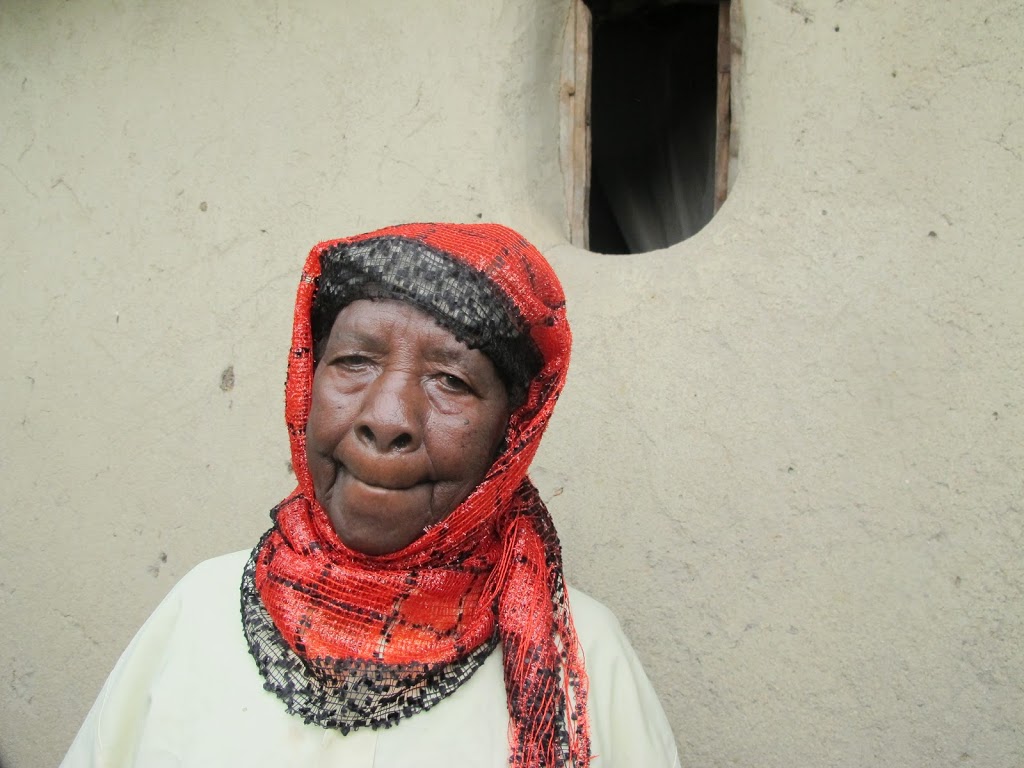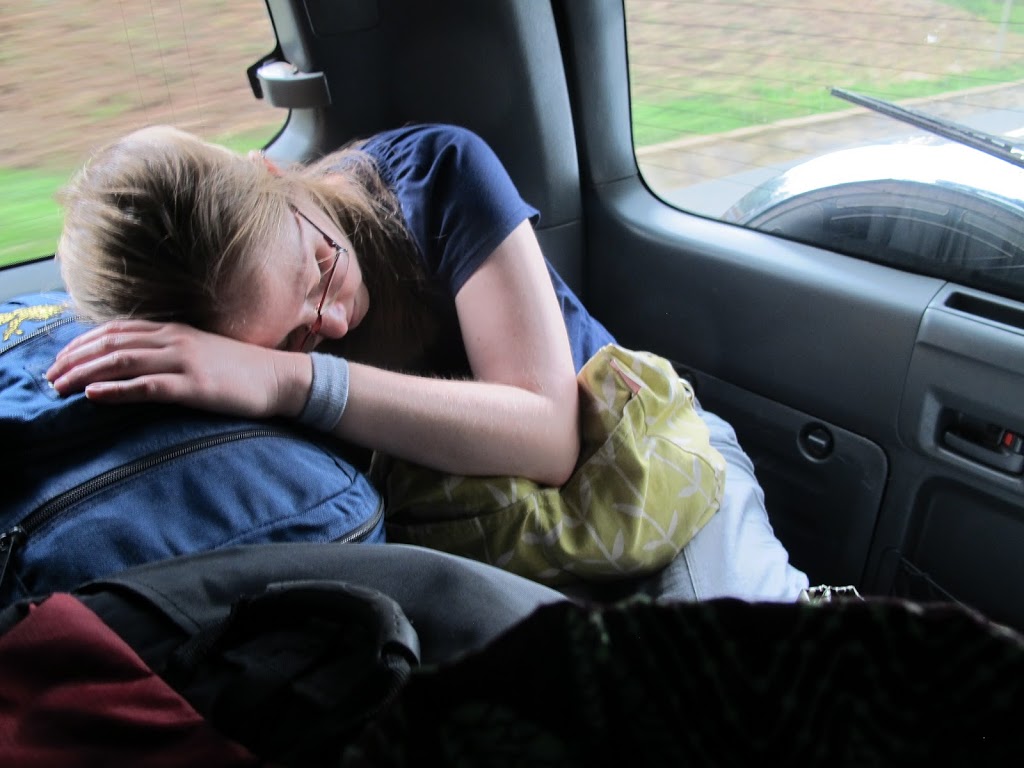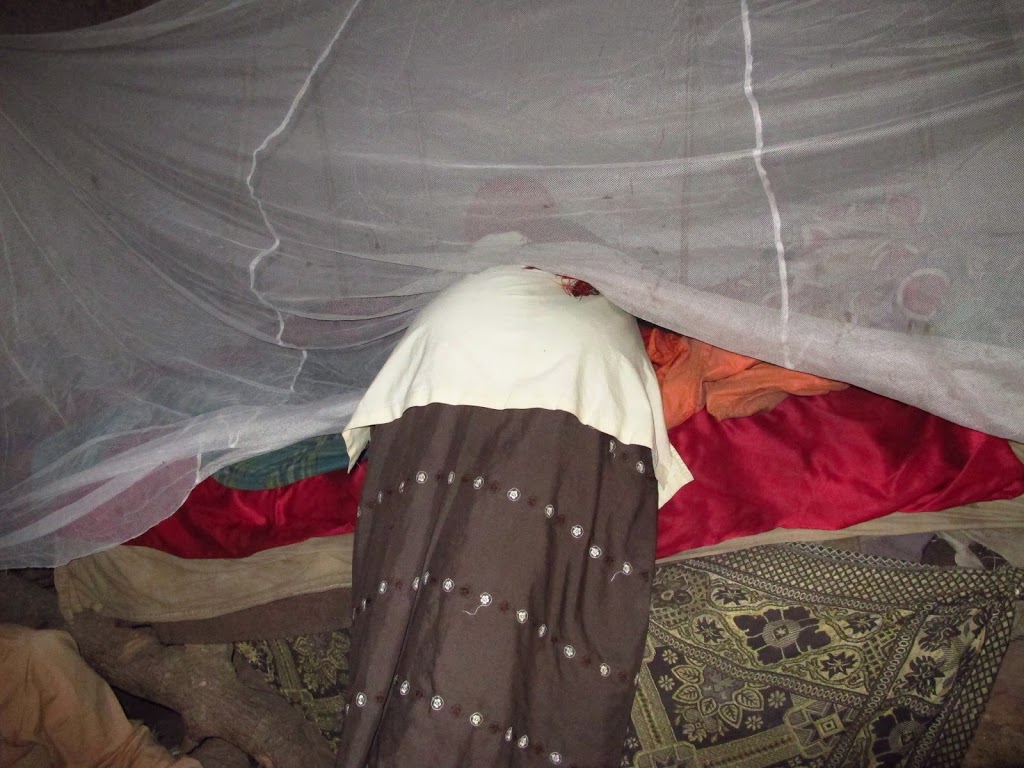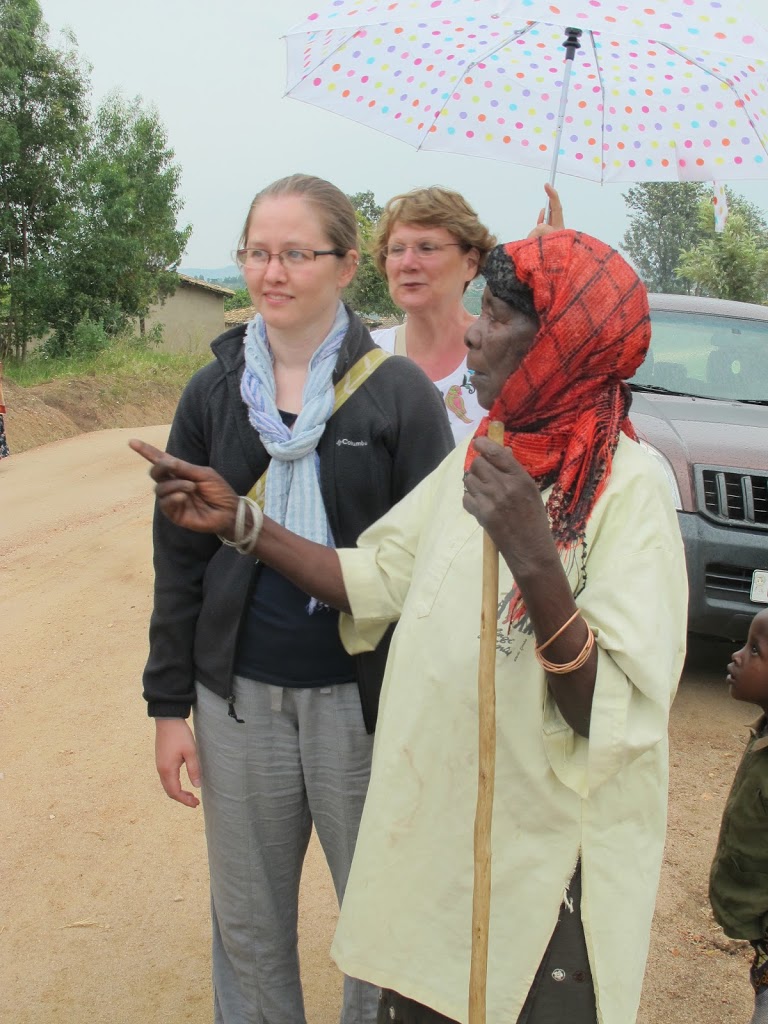I wasn’t there the first time my professor got to interview this spectacular woman, so I’m confessing here that some of this story is interwoven with bits of second-hand information, but the story wouldn’t be complete without it. She’s famous, so if you’re inclined to find the ‘absolute’ truth about Zula, I’m sure you can look her up—but what is truth anyway??
 |
| Zula — Photo by Dr. J |
Originally in our travel plans, we had worked in time to find this woman, Zula, on behalf of research my professor is doing with one of her many amazing mentors. Looking into the process of peace and reconciliation, they only knew the village this woman was supposed to live in and nothing more. Our dear Rwandan friend tracked her down through mobile phone networks (because I really think everyone here knows each other in some way or another) and it turns out, just on the eve of leaving for our trip, that Zula was invited to take part in a genocide memorial service right here in Kigali. We quickly changed our plans so that we could meet her. Unfortunately, my work with the Ministry ran late, so I never made it to the service or the interview—Thanks slow internet connection!! The interview apparently went wonderfully. My professor presented her with a gift of a scarf, which she immediately added to her exceptionally eclectic outfit. Then, drawing out a peace medal of some sort from the inner sanctum of her bra, proceeded to use the gift bag as a carrier for her most precious items. Among her life stories, she expressed deep concern over my professor’s moles (which would be unnoticeable to nearly anyone else) and spoke at length about her love for former President Bush. Quirky doesn’t begin to describe her. My professor made such an impression that she was invited to visit Zula in her village home the following week, and thankfully, this time I got to be a part of it.
 |
| Sleeping with the luggage – Photo by Dr. J |
I slept in the back of our SUV in an attempt to prepare myself for the training I would have to do at the Ministry the next day, so I’m not really sure how we got to this village. All I know is, at some point we turned down a bumpy dirt road that was so rocky I could no longer sleep. The next thing I knew, some man who claimed to speak French but clearly did not jumped into the car with us to show us exactly where to go. The road can only take one but so far, so we jumped out and were lead toward a path that required a small leap of faith across a trench and up a steep bank. I billy-goated my way across and was thankful that I’d worn my trusty walking shoes that day instead of sandals. We wound up the footpath and past plots of coffee and sunflowers. Our guide turned into a small compound, the fence of which was made of long twigs strung together now overflowing with vines—nothing more. Just as you turned into the compound, the ground drops from beneath your feet. It’s about a 2 foot decent with some stones that couldserve as steps into the living space of Zula and her family. To the left of the entrance is an outdoor storage area with a wood-burning kitchen stove (fire with pots on top) and to the left is the very modest house from which the outer clay shell was crumbling to expose the wooden structure beneath.
Zula was seated with her family on small, uneven wooden benches but immediately rose to greet us. They moved to allow us to sit, and as large drops of rain began to fall from the sky, we all cowered under brightly printed umbrellas and concluded the formalities of introductions and thanking her for welcoming us. Despite her amazing feats, she is a grandmother just like any other. We got a small tour of her compound, no more than 30 steps long and 20 steps wide. She led us around the back first. The path around the house was lined with vegetation, including huge aloe plants, and ended under a small round window just high enough you couldn’t see inside. To the left was a small shelter with a hole inside that served as a toilet—clean but rugged. The old woman talked intensely, staring deep into our eyes and emphasizing sections of her story in ways that made us hang on every word even though she was speaking Kinyarwanda. Our translator (an informal one, so not used to doing word-for-word) summarized bits and pieces that only made Zula seem more eccentric than before.
“She says that, through this window, she used to pass food to survivors when they would get mad at her.” And then apparently Zula would repeat some of the same stories over and over again. Some of it was her undying affection for former President Bush (apparently one of his daughters visited Zula some years ago and she’s been infatuated ever since), recounting historical events pertaining to WWI which, according to her national ID card, was before she was born (in 1925), and going on about giving my professor a salve to cure her moles. Intermingled with all of this were bits and pieces of the story we’d come to hear.
Zula is a Muslim woman in a community of mostly Christian people. She also dabbles in herbal remedies. During the genocide, people came to her from all kinds of places asking for her help to keep them safe. Though her house and yard were small, and her resources scared, she allowed around 150 people to take shelter with her. If this is not remarkable enough, as the perpetrators of the genocide were knocking at her door time and time again to give up those she was protecting (she is a member of the ethnic group that participated in the majority of ethnic cleansing acts during the genocide), she used previous accusations that she was a witch to threaten curses upon them if they entered. She told them the vines that encapsulate her little house were poisonous and that they would suffer a terrible (supernatural) fate if they entered. In the end, though she had saved many, many lives during those three months, she is now ostracized by some of her community members for the role she played during the genocide. Nationally and internationally though, she is celebrated as a hero and an example of compassion and strength that resonates with many.
 |
| Digging through the medicine stash – Photo by Dr. J |
As Zula led us back to the front of the house, she pulled at the vines that lined her fence and told us that these were the vines she claimed had magical powers. She ripped a leaf off and began chewing it with her nearly toothless mouth that hid behind and impish grin. “It was just a lie.” she said. “These plants are used to help with fertility problems. Oh, and I have aloe. It’s good for your skin or for eating. I added it to the food I served to help protect the people that stayed here.” As we rounded the corner of her house, she pointed up to a tall, narrow tree. “Ten people lived up there during the genocide.” she said. She pointed to a tiny bowed section of the fence and explained that those who lived in the tree would sneak into the compound through this part of the fence to get to the house. We moved around to the outdoor kitchen where her family sat outside on the benches watching us. We went into the house where she pointed to the narrow wooden rafters that support the roof. “People also hid up there. And under the bed. And some were under the bed, and some were on top of the bed.” Essentially, the four rooms of the house held people wherever they would fit. And there they stayed until the chaos ended three months later.
I was struck by the ordinariness of this place. As I watched this old woman, a national treasure I’m sure, dig through her medicinal stash while draped over a bed in the corner stacked with mattresses, I thought about what it takes for someone to do something like this. It ended after three months, but what if it hadn’t? You don’t know when you take people in that things will change soon. Had it been anything like the Holocaust of Nazi Germany, this would’ve dragged on for years. 150 people living on top of each other. But she didn’t think about that. When my professor asked her why she would do something like this, she basically just said that she did it because her mother did the same. The thing we forget about Rwanda is that the 1994 genocide was a (hopefully) culminating ethnic cleansing catastrophe to a series of back and forth ethnic violence. Knowing that her mother had risked her life to save others during a previous movement of ethnic cleansing, Zula didn’t hesitate to open her house and use what resources and social capital (as a witch) that were available to her. It demonstrates the actions of a true hero in my mind: act first, think later. But, life goes on. A chicken pecked about its business, attacking what few insects it found in the courtyard. A woman nursed a baby. Zula’s family members checked their text messages while waiting for us to leave. It was so normal. Toonormal.
 |
| Photo by Dr. J |
We said our goodbyes and made our way down to the path. Zula, shoeless and not seeming to notice the rain, rambled on about things that our translator couldn’t keep up with. One thing I forgot to mention about this woman: she was into me. Really into me. My professor said it probably had something to do with being young—maybe she associated me with former President Bush’s daughter who had come to visit. Who knows. What I do know is that it felt like she was almost always talking directly to me. She locked me in eye contact so intense and sincere that my brain fruitlessly strained to understand what she was saying to me. Deeply concerned for her health in the rain, my professor attempted to say our final goodbyes just at the edge of her property. As she explained to Zula what an amazing honor it was to have met her and how she was planning to include her story as part of a book she was working on, the grandmotherly woman held my hand, feeling each finger in its entirety with her own. Without really acknowledging the goodbye, she pressed on and began ripping up grass at the corner of a sunflower plot. As she tore up what looked like weeds, the smell of lemons filled the air and she told us we could make tea from it (lemon grass!). Her family just laughed at her quirky ways and tried to convince her to go home. She wouldn’t hear of it though, and she walked with us along the path back to the road. As we (foreigners) all paused at the steep bank that lined the trench, wondering how we’d navigate it without falling in the mud, Zula brushed past and nimbly leapt down the slope and onto the road. I followed and she held my hand and caressed me, speaking with great intention to me the entire way to the car. No translators were around, so I can only imagine what she said. Perhaps because we’d already been talking about the supernatural, I couldn’t help but wonder if she was channeling some connection with my recently deceased grandmother. Zula spoke to me like she knew me. Deep into my soul in a way that cut through linguistic barriers. I’ve met so many amazing people in this country, particularly on this journey, but I think she will forever hold a special place in my memory.
You can read more about this extraordinary woman in the book soon to be published by

Wow. Just, wow. Incredible. What a woman. I want to meet this amazing human being. She was truly seeing all the beauty and goodness in you, Erika. She is a healer, it seems, and she saw you.
Thanks for that, Tara. You nearly made me cry! :)